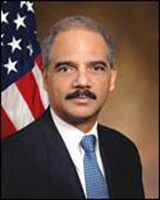By Pam Martens: May 15, 2013
We now know that the U.S. Department of Justice spied for two months on over 100 Associated Press reporters, secretly obtaining their work, home and cell phone records showing the phone numbers of their sources. The records covered phone calls made in April and May 2012 in AP bureaus in New York City, Washington, D.C., Hartford, Connecticut and the House of Representatives. No advance notification was given to the Associated Press.
Yesterday, the Reporters Committee for Freedom of the Press issued a stern critique of the Justice Department action, writing:
“The scope of this action calls into question the very integrity of Department of Justice policies toward the press and its ability to balance, on its own, its police powers against the First Amendment rights of the news media and the public’s interest in reporting on all manner of government conduct.”
Gary Pruitt, President and CEO of the Associated Press, wrote to Attorney General Eric Holder on May 13, stating:
“There can be no possible justification for such an overbroad collection of the telephone communications of The Associated Press and its reporters. These records potentially reveal communications with confidential sources across all of the newsgathering activities undertaken by the AP during a two-month period, provide a road map to AP’s newsgathering operations, and disclose information about AP’s activities and operations that the government has no conceivable right to know.”
Given the history of this administration, to say this action will have a chilling effect on whistleblowers and inside sources hardly captures the damage. Those sources – working for government, Wall Street, the private sector and academia – may be getting a pink slip from their employer in the days ahead. We have no sound basis to believe these sources will not be targeted for cooperating with the press.
This is just one more example of a President who promised a new age of openness between government and the press and miserably failed to deliver.
On January 21, 2009, President Obama’s first day in office, he issued an Open Government memo promising the American people a new era of transparency. On March 19, 2009, under the President’s orders, the U.S. Attorney General’s office issued detailed guidelines on how Federal agencies were to handle Freedom of Information Act (FOIA) requests. The guidelines read, in part:
“The key frame of reference for this new mind set is the purpose behind the FOIA. The statute is designed to open agency activity to the light of day. As the Supreme Court has declared: ‘FOIA is often explained as a means for citizens to know what their Government is up to.’ NARA v. Favish, 541 U.S. 157, 171 (2004) (quoting U.S. Department of Justice v. Reporters Comm. for Freedom of the Press, 489 U.S. 749, 773 (1989)…The President’s FOIA Memoranda directly links transparency with accountability which, in turn, is a requirement of a democracy. The President recognized the FOIA as ‘the most prominent expression of a profound national commitment to ensuring open Government.’ Agency personnel, therefore, should keep the purpose of the FOIA — ensuring an open Government — foremost in their mind.”
Despite that promise, records pertaining to Wall Street are routinely redacted so heavily by government agencies that they are rendered meaningless to the press. Bloomberg News and reporter Mark Pittman were forced to litigate for years attempting to learn about the financial interactions between the Federal Reserve Board and Wall Street during the financial crisis. Even after Bloomberg News won at the Federal District Court and Court of Appeals, the information was stalled before finally being produced.
Congressional hearings, buttressed with subpoenas and testimony under oath, should begin promptly.


